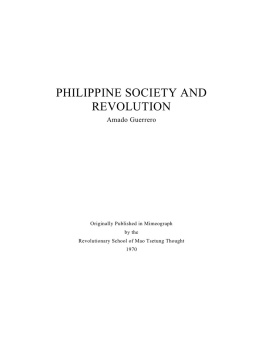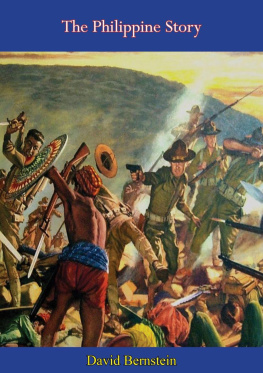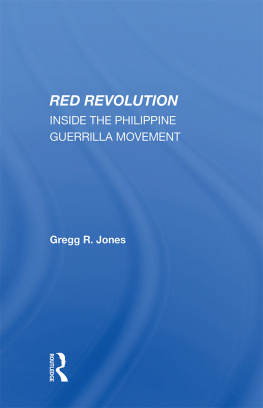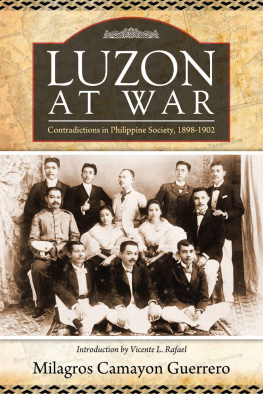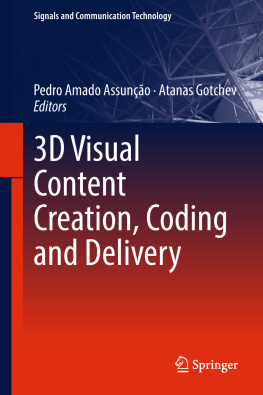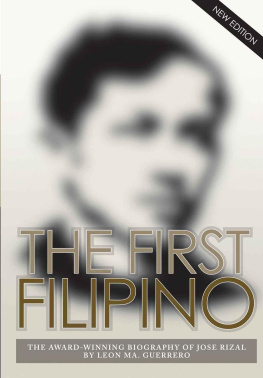Amado Guerrero - Philippine society and revolution
Here you can read online Amado Guerrero - Philippine society and revolution full text of the book (entire story) in english for free. Download pdf and epub, get meaning, cover and reviews about this ebook. year: 1971, publisher: Pulang Tala Publications, genre: Politics. Description of the work, (preface) as well as reviews are available. Best literature library LitArk.com created for fans of good reading and offers a wide selection of genres:
Romance novel
Science fiction
Adventure
Detective
Science
History
Home and family
Prose
Art
Politics
Computer
Non-fiction
Religion
Business
Children
Humor
Choose a favorite category and find really read worthwhile books. Enjoy immersion in the world of imagination, feel the emotions of the characters or learn something new for yourself, make an fascinating discovery.
- Book:Philippine society and revolution
- Author:
- Publisher:Pulang Tala Publications
- Genre:
- Year:1971
- Rating:4 / 5
- Favourites:Add to favourites
- Your mark:
- 80
- 1
- 2
- 3
- 4
- 5
Philippine society and revolution: summary, description and annotation
We offer to read an annotation, description, summary or preface (depends on what the author of the book "Philippine society and revolution" wrote himself). If you haven't found the necessary information about the book — write in the comments, we will try to find it.
Philippine society and revolution — read online for free the complete book (whole text) full work
Below is the text of the book, divided by pages. System saving the place of the last page read, allows you to conveniently read the book "Philippine society and revolution" online for free, without having to search again every time where you left off. Put a bookmark, and you can go to the page where you finished reading at any time.
Font size:
Interval:
Bookmark:
Philippine Society and Revolution is an attempt to present in a comprehensive way from the standpoint of Marxism-Leninism-Mao Tsetung Thought the main strands of Philippine history, the basic problem of the Filipino people, the prevailing social structure and the strategy and tactics and class logic of the revolutionary solution which is the peoples democratic revolution.
This book serves to explain why the Communist Party of the Philippines has been reestablished to arouse and mobilize the broad masses of the people, chiefly the oppressed and exploited workers and peasants, against U.S. imperialism, feudalism and bureaucrat capitalism now regnant in the present semicolonial and semifeudal society.
Philippine Society and Revolution can be used as a primer and can be studied in three consecutive or separate days by those interested in knowing the truth about the Philippines and in fighting for the genuine national and democratic interests of the entire Filipino people. The author offers this book as a starting point for every patriot in the land to make further class analysis and social investigation as the basis for concrete and sustained revolutionary action.
AmadoGuerrero
Chairman, Central Committee
Communist Party of the Philippines
July 30, 1970
Whoever sides with the revolutionary people is a revolutionary. Whoever sides with imperialism,feudalism and bureaucrat capitalism is a counterrevolutionary. Whoever sides with the revolutionarypeople in words only but acts otherwise is a revolutionary in speech. Whoever sides with therevolutionary people in deed as well as in word is a revolutionary in the full sense.
MAO TSETUNG
Because of the semicolonial and semifeudal nature of Philippine society, the present stage of the Philippine Revolution cannot but take a national-democratic character. It is a national-democratic revolution, a revolution seeking the liberation of the Filipino people from foreign and feudal oppression and exploitation.
It is a national revolution principally because it seeks to assert national sovereignty against U.S.
imperialism and its local running dogs. It is a democratic revolution principally because it seeks to fulfill the peasant struggle for land against domestic feudalism and furthermore it seeks to uphold the democratic rights of the broad masses of the people against fascism. The basic contradictions in Philippine society are those between the Filipino nation and imperialism, and those between the great masses of the people and feudalism. The fascism that is now on the rise is basically the military suppression of the people by the present counterrevolutionary state in behalf of its imperialist and feudal masters.
Because the principal objective of the present stage of the Philippine Revolution is to liberate the Filipino people from foreign and feudal oppression and exploitation, it can be said that it is a continuation and resumption of the Philippine Revolution of 1896 and the Filipino-American War, both of which ended in failure under the leadership of the local bourgeoisie, particularly under the liberal-bourgeois leadership of the Aguinaldo government.
There is however a basic difference between the present national-democratic revolution and the one that suffered defeat at the hands of U.S. imperialism. The present national-democratic revolution is of a new type. It is so by virtue of the fact that since the October Revolution and the emergence of the first socialist state from the ruins of an interimperialist war (World War I), the national-democratic struggles against imperialism, feudalism and bureaucrat capitalism in colonies and semicolonies have inevitably become part of the world proletarian revolution. Since then, the objective conditions for the national-democratic struggles against imperialism, feudalism and bureaucrat capitalism in colonies and semicolonies have inevitably become part of the world proletarian revolution. Since then, the objective conditions for the national-democratic revolution of the old type in the Philippines have ceased. The world bourgeois revolution has ceased to provide the correct orientation for the national-democratic revolution. More than ever, the old ilustrado leadership has sharply divided into the three strata of the comprador big bourgeoisie, national bourgeoisie and petty bourgeoisie with clearly different political attitudes. We are now in the stage of the new type of national-democratic revolution, the peoples democratic revolution.
The effective class leadership in the Philippine Revolution is now in the hands of the proletariat and no longer in the hands of the bourgeoisie or any of its strata as was previously the case in the old type of national-democratic revolution. U.S. imperialism, feudalism and bureaucrat capitalism cannot be overthrown unless the broad masses of the people are led by the revolutionary party of the proletariat, the Communist Party of the Philippines, under the supreme guidance of Marxism-Leninism-Mao Tsetung Thought. The revolutionary demands and aspirations of the working class, the peasantry, the petty bourgeoisie and the national bourgeoisie can be correctly brought forward and can be realized only under the class leadership of the proletariat and its party.
The Communist Party of the Philippines was established as early as 1930. But because it was seriously afflicted by bourgeois subjectivism in ideology, opportunism in politics and violations of democratic centralism in its organizational life, it did not only fail to carry out its revolutionary tasks despite extremely favorable objective conditions at certain periods, especially during the period of the anti-fascist struggle and thereafter, but it also failed to preserve itself substantially for the almost two decades that immediately preceded its reestablishment on December 26, 1968. That was mainly because the counterrevolutionary line of the Lavas and Tarucs prevailed within the Party until it was repudiated by a rectification movement inspired by Marxism- Leninism-Mao Tsetung Thought.
We are now in the era when imperialism is heading for total collapse and socialism is advancing to worldwide victory. The Great Proletarian Cultural Revolution has lofted high Marxism-Leninism of the present era, Mao Tsetung Thought, and has transformed the Peoples Republic of China into an iron bastion of the world proletarian revolution. The oppressed peoples of the world now have an invincible ideological weapon to defeat imperialism, revisionism and all reaction and can look forward to a socialist future that has become a reality in a significant part of the world. The universal truth of Marxism-Leninism-Mao Tsetung Thought is the invincible weapon directly wielded by the proletarian revolutionary parties leading the oppressed peoples of the world. There is now the Communist Party of the Philippines which is arduously striving to apply the universal truth of Marxism-Leninism-Mao Tsetung Thought to the concrete conditions of the Philippines.
There is now the New Peoples Army under the command of the Party to deal deadly blows against armed counterrevolution and build the iron bastions of the revolution in the countryside before the seizure of power in the cities. There is now a united front for waging peoples war and isolating the enemy diehards. It is based on the alliance of the proletariat and the peasantry, comprising more than 90 per cent of the people, and furthermore it embraces the petty bourgeoisie, national bourgeoisie and other patriots. The local allies of U.S. imperialism -- the big bourgeoisie, the landlord class and the bureaucrat capitalists -- are coming fast to their doom.
Font size:
Interval:
Bookmark:
Similar books «Philippine society and revolution»
Look at similar books to Philippine society and revolution. We have selected literature similar in name and meaning in the hope of providing readers with more options to find new, interesting, not yet read works.
Discussion, reviews of the book Philippine society and revolution and just readers' own opinions. Leave your comments, write what you think about the work, its meaning or the main characters. Specify what exactly you liked and what you didn't like, and why you think so.

